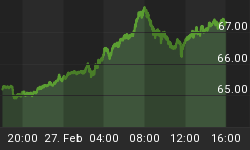Below is an extract from a commentary originally posted at www.speculative-investor.com on 30th October 2005.
Confirmation that Ben Bernanke will be taking over from Alan Greenspan as Fed chairman early next year has some implications for the financial markets -- which we'll discuss below -- but we don't think it is a major deal. This is because, in our opinion, the times make the Fed chairman, not the other way around. Specifically, during periods when overt inflationism fits the general mood of the markets the Fed chairman will be an overt inflationist (if he is not then he will be replaced by someone who is). By the same token, when the markets are crying-out for an inflation 'hawk' then an inflation hawk is what they will get.
The reason that Greenspan enjoyed such a lengthy stay in the job was that he changed with the times. For example, during his first few years as Fed chief he was a Volcker-like inflation 'hawk', but his tune gradually changed over the years to the point where he became one of the leading touts of the so-called "new economy" during the late-1990s, and, following the bursting of the technology bubble, a no-holds-barred inflationist.
In any case, regardless of whether the Fed chairman's public persona is that of an inflation 'hawk' or an inflation 'dove', a large increase in the money supply (inflation) is what we always end up getting. For example, William McChesney Martin -- Fed Chairman during the 1950s and 60s -- came across as a prudent guardian of the monetary system, but he presided over massive inflation; Paul Volcker came across as a vigorous inflation fighter, and yet he presided over massive inflation; and Alan Greenspan changed his colours like a chameleon but when he leaves the Fed in January he will have presided over massive inflation. As such, within the financial universe there are few prospects that could be closer to a certainty than the prospect of Bernanke's term at the top of the Fed being characterised by massive inflation of the money supply. Probably not immediately because a deflation scare is almost mandatory as far as the coming 12 months are concerned, but eventually.
There are, however, some specific market implications of having Bernanke at the helm of the Fed, one being that he is an unknown quantity. The markets have become comfortable with Greenspan and, importantly, with Greenspan's proven ability to keep the inflation going whilst maintaining confidence in the financial system. A general lack of certainty regarding the new Fed chief's ability to do the same is something that might lead to additional volatility in the markets when the next financial crisis occurs.
Another potentially significant implication is that Bernanke is in favour of using monetary policy to target specific increases in the Consumer Price Index (CPI). If he acts in accordance with his stated beliefs he might, for example, decide to adjust monetary policy in order to achieve annual CPI growth of around 2%. But conducting monetary policy in this way in the current environment would inevitably result in HIGHER-than-usual inflation (money supply growth) because a) the natural tendency of prices is to trend lower over time in response to productivity improvements, so a certain amount of inflation would always be needed just to stop prices from falling, b) the CPI is calculated in a way that drastically under-states the dollar's loss of purchasing power, meaning that in order to achieve an annual increase of 1-2% in the CPI there would probably have to be enough inflation to reduce the dollar's actual purchasing power by 5-6% per year, and c) the downward pressure on goods prices due to the large amount of manufacturing that now takes place in low-cost regions of the world means that even more inflation than usual would be needed to keep the CPI in an upward trend. In other words, if Bernanke really is going to use monetary policy to keep the CPI increasing at, say, 2% per year then we can look forward to a lot of money-supply growth over the next several years. This, of course, will be bullish for gold.
Generally, in an environment where there is substantial downward pressure on prices the mistake of defining inflation and deflation in terms of price changes -- as opposed to defining them correctly in terms of money-supply changes -- has the potential to create more problems than usual. This is because the definition-challenged majority will remain oblivious to the inflation for longer than would otherwise be the case.
The effects of the inflation will, however, always be evident in some prices even if most people don't realise that inflation is the driving force behind the price rise. We won't be surprised, for instance, if at some point over the next few years the situation arises where many well-respected analysts are scratching their heads in disbelief and asking questions like: "Why do we have a 4-digit gold price when the Fed is doing such a good job of keeping inflation in check?"















